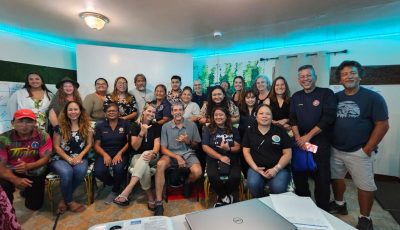Tourism money is essential moving piece in budget play
The reallocation of Marianas Visitors Authority earmarks remains the essential building piece for lawmakers who intend to pass a budget bill that first moves power bill funds from the local hospital, as well as money for public streetlights, in order to fund salary increases for department heads on Tinian and Rota, among others, while making up for the hospital’s million of dollars shortfall by having MVA earmarks foot the hospital bill bottom line.
This, in a nutshell, is how some House representatives think of their Senate counterparts’ proposed fiscal year 2016 budget provisions, which sources salary increases from hospital utility subsidies, but makes up for this $2 million shortfall by directing MVA to fork over this amount from excise tax revenues that Gov. Eloy S. Inos has earmarked for the tourism body.
All these against the backdrop of a racing clock that requires a budget to be passed by Sept. 30—the end of the fiscal year—or the Commonwealth government will be forced to shut down.
According to a Senate financial analyst who was consulted during a budget conference meeting yesterday, the Senate sourced their provisions for salary increases out of some $4.2 million from which the Department of Public Works was set to get some $1 million to $2 million for streetlights, and the Commonwealth Healthcare Corp. was to get some $2 million for utilities.
Rep. Felicidad Ogumoro (R-Saipan) repeated yesterday that she would not allow CHCC money to be touched.
Sen. Jude U. Hofschneider (R-Tinian), on the other hand, urged for “equity” for all senatorial districts, noting that department heads in these districts “are equally significant.”
Under the Senate provisions, department heads on Rota and Tinian would see their salaries jump from $36,000 to $45,000.
These provisions, under “Section 607. Salary Cap Exemption,” also amend the annual salary of Tinian and Rota deputy commissioners to $45,000.
The provision also boosts from $54,000 the salary of the special assistant for management and budget/CIP administrator—Vicki Villagomez—to “not less than $62,000.
Rep. Antonio Sablan (Ind-Saipan) noted the “merits” of the increases and said they appreciated the responsibilities of these positions but said that that these provisions will be impacted based on where they go with the Senate’s provisions on “outside sources,” which appear to fund the salary increases.
Sec. 712 of the Senate’s budget bill directs MVA to move some $2 million to CHCC for utilities, and in essence, makes up for the money used to raise salaries.
“We are essentially taking away from CHCC subsidy and streetlight funding,” said Sablan. “When we touch streetlights or the CHCC subsidy we have to find a way to replace that.”
Sablan said the “justification [for salary increases] was not the issue, it is the source of funding.”
At one point in their afternoon discussion, when CHCC was brought up again, Ogumoro said budgeting was “all about priorities.”
“Say what our priorities are and prioritize our monies accordingly,” she said, urging lawmakers to stay away from CHCC funds.
To this, Sen. Arnold Palacios (R-Saipan) said the MVA reallocation “is replacing that money.”
“If you look at the bottom line, we are not taking the money away,” Palacios said.
“At the end of the day, CHCC is still going to have that funding,” added Sen. Steve K. Megson (R-Rota).
Cool’s proposal
While lawmakers debated salary increase funding sources and funding to the courts in the morning, House and Senate legal counsels discussed separately their jarring legal positions on the amending of earmarks statutes within a budget bill.
Emerging from this discussion in the afternoon part of the meeting, both House and Senate legal counsels said they still disagreed over the constitutionality or their respective authority or lack of authority in reallocating MVA funds.
However, House counsel John Cool offered one proposal that the House and Senate debated the rest of the day.
According to the lawyer, a provision in the Planning and Budget Act—which is part of the Commonwealth Code—allows that “the budget programs of each government corporation shall be transmitted to the Legislature for approval, rejection, or modification as a part of the annual budget submission.”
Cool said he went to the Act’s definition for “governmental corporations” and included on the list of government corporations was the Marianas Visitors Authority.
In short, if laid out as a provision in the Budget Act, the Legislature could “modify” the MVA budget via this authority.
A draft of this proposed “compromise” was shared later among lawmakers. In essence, it takes the Senate’s provisions on “outside sources” which directs MVA to help fund Divisions of Customs equipment and the hospital utilities, and adds them under a “Sec. 301” of the budget under “Appropriation and Budget Authority.



























